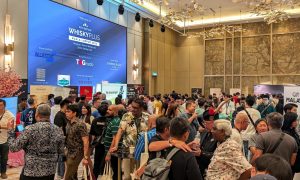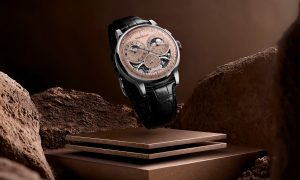This post was written by Pamela Nowicka
Life in any city comes with risks, and Pamela Nowicka gets the advice of Penang-based security consultant Conor McManus on how to stay safe inside and out when living in Penang.
WHILE MALAYSIA IS, fundamentally, a safe country, security can be a concern for people living here, whether they are here for the long or short term.Thus, when I met Conor McManus, a corporate security consultant and ex-military Special Forces now living in Penang, I used the opportunity to pick his brain on staying safe.
Serious Security
For someone who has worked on VIP close protection – including protecting presidents and other heads of state – and who has had “a military role” in East Timor and Lebanon, Conor presents a chatty and unexpected relaxed exterior. His 14 years of working in a “zero defect type of environment” have demonstrated the value of competency planning, and know-how, while an MBA helped him link his military knowledge with corporate and organisational knowledge.
To someone like me, whose view of military life is traipsing through mud with a large rucksack and parachuting at night behind enemy lines, Conor’s assertion that “most of our jobs are not about going to fight” is a bit of a surprise. “It’s about gathering information, people skills, keeping a low profile. Professionalism, maturity, and emotional intelligence.The military spend a lot of time training leadership.You can never get someone to go into battle if you can’t lead them.”
His skill sets run the gamut from training security guards to advising on corporate and maritime security and executive protection, as well as soft skills and leadership training. Conor was the safety consultant for the Penang Bridge and, in another project, saved one company “a few million in three months in terms of theft.”
“I get results,” he asserts. “I get the risk down.” He sounds like just the person to offer some advice on all aspects of personal safety and security.
Looking out for Number One
Sensing that I was just flitting over the surface of a vast reservoir of expertise, I asked Conor for some hints and tips on personal safety.
“Everything is behaviour and opportunity,” observes Conor, “how you’re perceived.When people see a white person in Malaysia, they think ‘tourist’ or ‘money’ depending on how the person is dressed. Women are often seen to be an easier target.The key is to make yourself a harder target.”
For many people, snatch thieves are a concern. “If you’re coming out of a bank, or leaving an ATM, be aware of your surroundings,” instructs Conor. “Preferably don’t carry a handbag, but if you do, wear it in front of you.Walk against the traffic.Walk in a group. Do things during the day, not at night. Don’t leave your handbag on the car seat. Don’t carry too much money. Don’t invite them to take the money. Risk management is all about prevention.”
Other pieces of advice include: don’t wear jewellery or valuable watches, and don’t dress too expensively, or have a fl ashy car. “Stay in populated areas with people around, or near a police station. Car parks are quite dangerous, especially late at night, so, if possible, get someone to go with you.”
But before Penang residents get completely alarmed, Conor has a word of reassurance. “Malaysia, overall, is very safe compared with Europe,” he observes, “and Penang is safer than KL.”
Safe as Houses
In terms of home security, all may not be as it seems. “Don’t trust your security,” says Conor. “The biggest threat is your maids and security guards.The risk goes way up with dodgy security guards, who are not necessarily vetted or trained, to poorly maintained security systems. Ask the management committee who should vet the guards to get a professional to look at them. Often what you’re getting is warm bodies, poorly paid, on double shifts; all this can undermine their ability to perform.
“Vary your routine,” he warns. “Most threats happen when you’re out of the house, and if people like plumbers are coming to do work in your house, don’t leave valuable stuff lying around.”
In the home, Conor advises that householders should get an alarm system. “It’s about perception. Get a visible alarm system and a good quality installer, if possible by recommendation.Things will be oversold. A CCTV camera tells you you’re being robbed, but may not be a great help in terms of prevention.”
While locking doors is vital, Connor asserts that even more important for jewellery and similar valuables are keeping them in a safety deposit box, or in a safe that is bolted to the ground. “Lock up your electrical items. Deter. Detect. Delay. Respond. Recover. Security is like an onion,” he adds, cryptically. “Get a dog. Leave a pair of men’s boots outside. Fencing is important. Briars or bushes are good. So are spotlights, and motion sensor lights.
“Condominiums are safer because they’re off the ground and people can’t get in through your front window. But have a basic awareness of what to do in case of a fire. Know how to get out, and check where the fire exits are. Have a smoke alarm fitted and keep a fi re extinguisher.”
Road Safety
It is not inside the home, or even walking around the streets, where the main hazard lies. “The most dangerous thing in Malaysia is driving on the road,” says Conor grimly. “Over 6,000 people are killed annually.Then there’s road rage. If you’re a foreigner and involved in an accident, don’t get out of the car. Stay in the car, call a friend. Don’t get aggressive, especially if you’re a guy. Have a number for a breakdown service, friend or police on speed dial on your phone.”
Conor makes the point that if an emergency does occur, the language barrier may make it difficult for police to respond. “Community watch programmes are the most effective way to reduce risk, and the police will help in setting them up.” Response is a key issue. Ambulances don’t have GPS and the personnel are not trained, so a basic knowledge of first aid can be helpful.
“But,” says Conor finally, “don’t feel paranoid. If you do get into a situation, remember you are not Jackie Chan, Bruce Lee, or James Bond. Let them go. Get an expert to give you advice and make sure anyone who installs a device is police vetted. Just because you say you’re in security, doesn’t mean to say you’re secure. Many times it’s an inside job. One installer came back and robbed the place.”
“Having said that, 99% of people are trustworthy,” Conor asserts. “Reducing the opportunity reduces the risk. But life is risky and we all want to enjoy ourselves. It all depends on how you want to live life.”
———————————————————————————————————
For more advice, contact Conor on conor@c-riskmanagement.com or 04.890 6551.
———————————————————————————————————
Source: Penang International December 2012 -January 2013
Read more:
- The Streets of Pulau Tikus
- An Expat Couple’s Restored-Heritage Home in Penang
- Penang: Simple Pleasures
Register for free on ExpatGoMalaysia.com
















